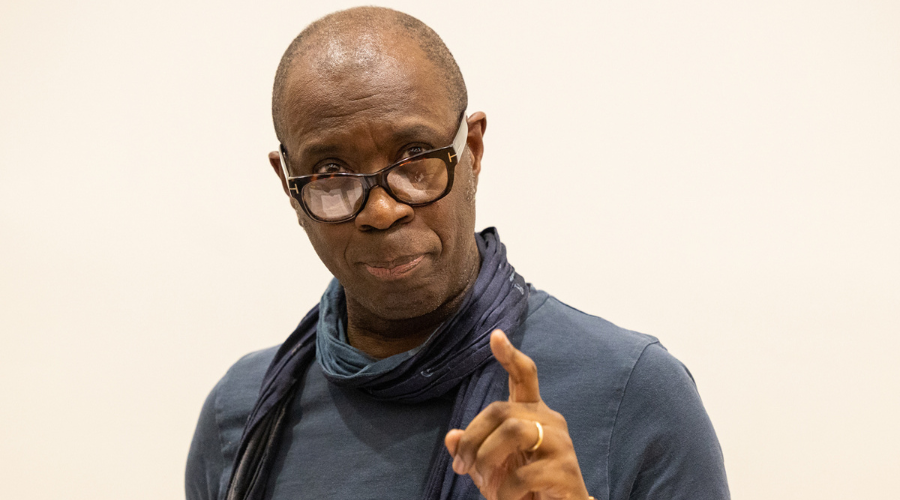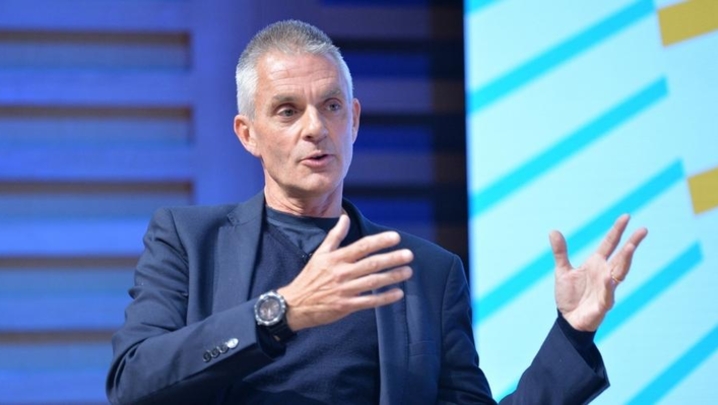Clive Myrie mounts a passionate defence of an organisation that he says helps define who we are as a nation
BBC journalist, Mastermind presenter and opera lover Clive Myrie didn’t pull any punches as he defended his employer in this year’s Steve Hewlett Memorial Lecture, entitled “The BBC: Destroy at your peril”.
Myrie, who joined the BBC in 1987 as a trainee local radio reporter, laid out his reasons why the licence fee was a better way of funding the corporation than subscription. He stressed the importance of a trusted, impartial news service and the BBC’s universality at a time when notions of truth have become subjective and impartiality “a false God”.
He spoke to packed audience at the University of Westminster as the corporation waits to find out if the Truss administration’s attitude to the licence fee will be as harsh as her predecessor’s.
“What I’m hoping to do is show that the corporation, in fulfilling its core purpose, sits at the very heart of our society – actually helping to keep this country together,” Myrie said. “The BBC is a binding agent that unites us all, a kind of social glue. The corporation is actually, I believe, fundamental to who we are, and our idea of ourselves.”
Myrie emphasised that the licence fee represents extraordinarily good value for money. For 44p a day, audiences receive a vast array of output encompassing drama, documentaries, sports, news and current affairs across radio, TV and the widely well-regarded BBC iPlayer.
He gave his lecture on the day Truss was declared the winner of the Tory leadership contest, but before the BBC won universal praise, even from some of its harshest critics, for its coverage of the death of HM Queen Elizabeth II, the period of mourning and her state funeral.
The BBC’s income for UK services is 30% lower in real terms than it was a decade ago. The latest licence-fee deal froze the fee at its present level for two years, meaning it will stay well below the rate of inflation until at least April 2024. The previous culture secretary, Nadine Dorries, said she wanted to abolish the fee by 2027.
"Due impartiality is simply what’s fair"
Respected by his peers – at the 2021 RTS Television Journalism Awards, he won both Television Journalist of the Year and Network Presenter of the Year – Myrie emphasised the value of accurate, impartial news reporting. “When it comes to the news division, the most important characteristic has to be trust,” he said.
Independent research by Survation on behalf of BBC Education showed that the corporation was the most trusted news source for young people among traditional broadcast and print media, and much more trusted than digital media such as Instagram, TikTok and YouTube.
“Who knew? Young people may be glued to their smartphones and tablets for hours every day, but that doesn’t necessarily mean they trust what they see, unless it’s news provided by the BBC,” said Myrie. He added that acknowledging the BBC’s successes does not, however, mean ignoring public concerns about bias, impartiality or possible group think.
“The corporation is not and should not be above scrutiny. Indeed, it must be held to the highest standards, even when others are not,” he insisted.
Impartiality, or more correctly, due impartiality, seems to have become an analogue concept in a digital world, he suggested. “It sounds technical, bureaucratic, it sounds very BBC. I’m going to use a different word: fairness. Due impartiality is simply what’s fair.”
Myrie painted a bleak picture of what could happen to broadcast news when rules governing impartiality are relaxed. He reminded the audience that it was Ronald Reagan who in 1987 abolished the so-called fairness doctrine in the US, which insisted that broadcast news covered controversial topics in a balanced way.
“It led to the rise of talk radio, shock jocks, Fox News and MSNBC and the complete disaster that is the America media landscape of today,” said Myrie, who was the BBC’s Los Angeles correspondent from 1997 to 1999.
The news broadcaster punctuated his lecture with clips from his work as a foreign correspondent and news anchor, plus the 1980s promotional film What does the BBC do for me?, fronted by John Cleese, and the more recent promo, The BBC is something that belongs to every one of us.
There was also a clip of the former BBC Director-General Tony Hall speaking in 2020 about the crucial role the broadcaster played in the early months of the pandemic.
Myrie noted that, when the country had its back to the wall during the first lockdown, audiences for BBC News soared. “It was made clear to us in the newsroom, right at the start of the nightmare, and in no uncertain terms, that, whatever happened, the main news would, and must always, go to air as scheduled.”
In those dark times, when many felt their lives were in supended animation, the corporation’s role as a universally available public service broadcaster was lauded: it stepped in with virtual church services, local BBC radio stations partnered with volunteer groups to help co-ordinate support for the elderly, housebound and those at risk.
And, “perhaps most spectacularly”, the BBC delivered a 14-week initiative of educational programmes and lessons to every household in the country.
Subscription streaming services such as Netflix and Disney+ also prospered during lockdown as people were stuck at home and wanted entertaining. Latterly, the idea of scrapping the licence fee in favour of a voluntary subscription has once again gained traction.
“On the face of it, the subscription model might seem very attractive to the BBC’s critics such as the Tax Payers’ Alliance – and possibly even to some within the BBC, if streamers are making Jacuzzi-loads of cash,” suggested Myrie.
If only things were that simple. “The market is now saturated – HBO Max, Hulu, Amazon Prime, Apple TV+. There are too many companies going after too few subscribers. Supply is exceeding demand,” claimed Myrie.
He relayed a conversation with London Business School deputy dean Oded Koenigsberg, who argued that subscription models were “appallingly inefficient” and described them as the “kiss of death” for those without sufficiently large customer bases. “Producing marquee, eye-popping television can be a bottomless money pit. While the cost of producing great content goes up, consumers end up paying less per unit of consumption.”
Showing examples of the BBC’s coverage of the Ukraine war, Myrie said simply, “Netflix ain’t doing that,” adding, “The BBC, along with my colleagues at Sky, Channel 4 and ITN, produce Ukraine coverage of a quality to rival any broadcaster on the planet.”
During a post-speech question and answer session, a US audience member drew a round of applause when he said he’d moved to London from New York “because of the BBC”, praising its programmes and the ability to create a “certain amount of community”.
Another member of the audience, Alison Maitland, pondered what she and others could do to support the BBC. One option proposed was to for people to write to their MPs. “Getting in touch with your MP is not a bad idea,” Myrie acknowledged. But Andrew Edwards pointed out that the BBC newsman had failed to address the real issue: why various well-connected BBC board members hadn’t been able to capture the ear of government regarding the value of the BBC “since 1986”.
“It doesn’t matter how culturally rich and important an organisation is, [and whether it is] feeding the minds of young people or whatever – politically, if it ain’t in your camp, you ain’t gonna have it,” Myrie noted ruefully.
Report by Stuart Kemp. The Steve Hewlett Memorial Lecture was given by Clive Myrie on 5 September. It was co-produced by the Royal Television Society and The Media Society, with proceeds from the event going to the Steve Hewlett Scholarship Fund.





